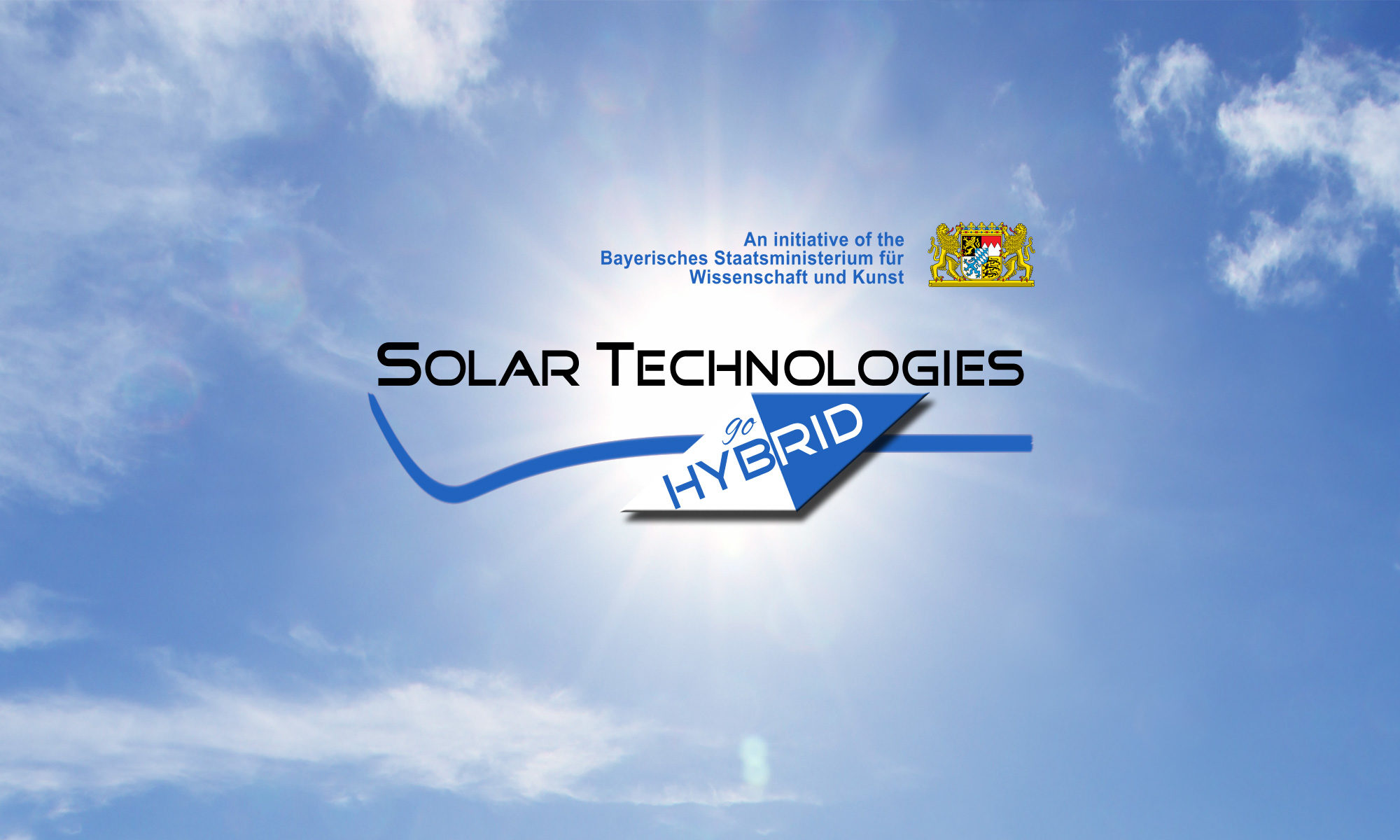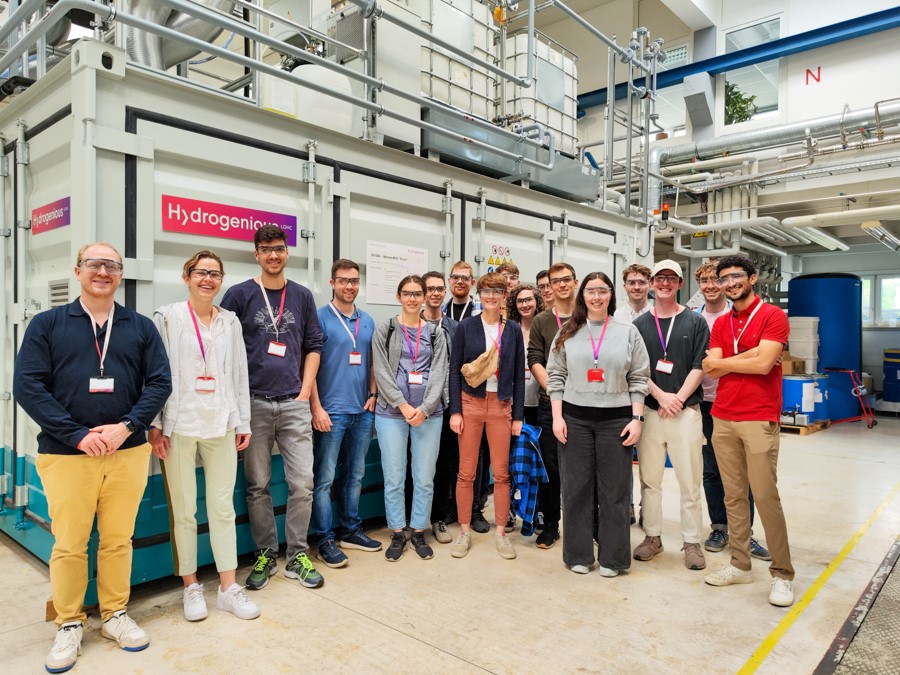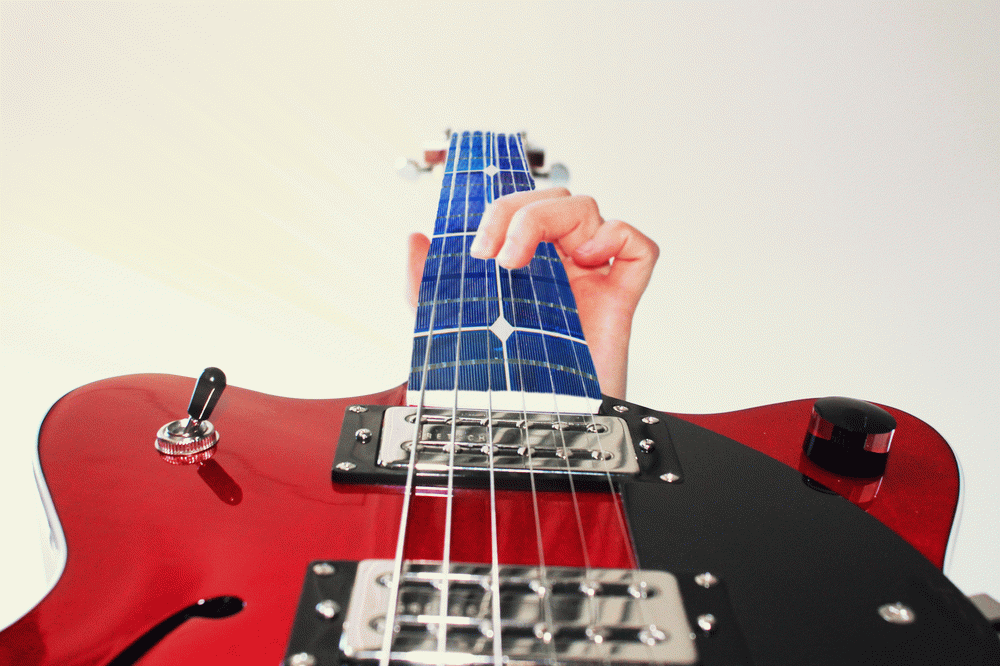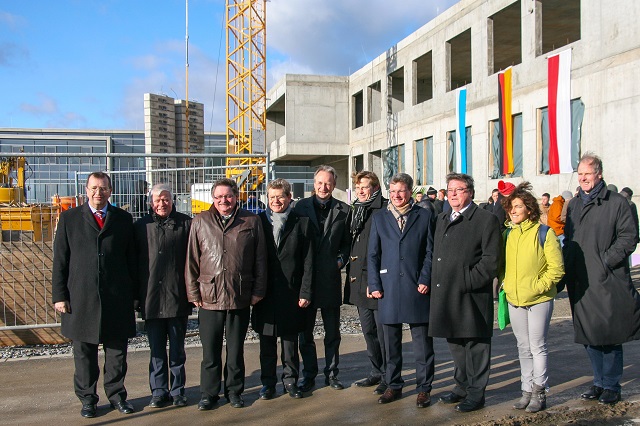Anlässlich des 10-jährigen Bestehens des Zentrums für Nanosystemchemie fand an der Fakultät für Chemie und Pharmazie ein Symposium mit nationalen und internationalen Sprechern statt. Mit dem Spatenstich am 7. Juli 2014 für ein Forschungsgebäude für das Zentrum für Nanosystemchemie (CNC) hat sich der Freistaat Bayern im Rahmen des Energieforschungsprogramms "Solartechnik go Hybrid", in dem fünf bayerische Universitäten (Bayreuth, Erlangen-Nürnberg, LMU und TU München, Würzburg) auf dem...
Continue reading "%s"
Registration open: 13th SolTech Conference 2024 in Nürnberg (25 – 27 Sept. 2024)
Registration for the 13th SolTech Conference 2024 in Nuremberg is now open. Further information and the registration can be found on the conference website.
SolTech Student Board Meeting (May 16-17 2024)
The SolTech Student Board convened on May 16-17 for a series of educational visits and meetings aimed at exploring cutting-edge technologies and research facilities. The itinerary included site visits to Hydrogenious LOHC Technologies, various laboratories at Friedrich-Alexander-University Erlangen-Nürnberg (FAU), a cultural visit to the Erlangen Bergkirchweih festival, as well as a tour of Bosch's fuel cell power module facility in Bamberg. The day began with...
Continue reading "%s"
Continue reading "%s"
13th SolTech Conference 2024 in Nürnberg (25 – 27 Sept. 2024)
The 13th SolTech Conference is organized by FAU Erlangen-Nürnberg and will take place from Sept. 25 (noon) - 27, 2024 in Nürnberg in the conference center of IHK Nürnberg (https://www.ihk-nuernberg.de/sites/en/). During this event international experts will present the current research and discuss with all members of the SolTech keylabs. Further information and registration can be found on the conference website: https://www.soltech-go-hybrid.de/soltech-conference/
Mini-Symposium “SolTech Meets Industry” 2024
The next "SolTech Meets Industry" mini-symposium will take place in Nuremberg on Wednesday, 10 April 2024. Alumni of the SolTech initiative will give presentations to PhD students and postdocs about their career paths in industry. There will also be an opportunity for personal networking.
12th SolTech Conference in Würzburg 2023
Within the Bavarian research network “Solar Technologies go hybrid” (in short “SolTech), KeyLabs at the universities of Bayreuth, Erlangen, Würzburg, and the two Munich universities LMU and TUM combine their respective specific expertise in materials and processes for "solar energy conversion". The network is generously funded by the Free State of Bavaria and supports in particular young scientists and students toward a future career as...
Continue reading "%s"
Continue reading "%s"
SolTech Student Board Meeting 2023
This year, the KeyLab at the University of Würzburg is responsible for the organization of the Bavarian research network on “Solar Technologies Go Hybrid”. In this framework the annual meeting of the student board took place in Würzburg on May 31 and June 1. We had the pleasure of welcoming a diverse and international group of young researchers from all five KeyLabs to this event....
Continue reading "%s"
Continue reading "%s"
SolTech Conference 2022 at the Nano-Institute (LMU Munich)
read more (pdf)
SolTech Student Board Meeting 2022
On September 1st and 2nd, the SolTech Student Board meeting took place in Munich, with this year’s hosting university being the Ludwig Maximilian University of Munich (LMU). The get-together kicked off with a visit to the Campus Grosshadern. The researchers at Prof. Thomas Bein group and Prof. Achim Hartschuh group welcomed the board into their labs, presenting their advances in field of energy conversion and...
Continue reading "%s"
Continue reading "%s"
Research proposal for SolTech3.0 approved
Our research proposal for SolTech3.0 focusing on new pathways to synthetic fuels by exploring sustainable materials and hybrid concepts got approved. The State of Bavaria together with the 5 involved Universities will continue to support our research consortium for the next 5 years.
Soltech International conference went online!
The ninth international SolTech conference successfully took place from 5th October to 8th October 2020 as an online conference with more than 150 participants. Invited Speakers from Melbourne (Lianzhou Wang), Seoul (Nam-Gyu Park), Göteborg (Christian Müller) and Berlin (Claudia Draxl) gave live talks and all five KeyLabs were connected in a mixed live and presence format. On the second day, each KeyLab organized local poster...
Continue reading "%s"
Continue reading "%s"
2nd “Soltech Meets Economy” Event in Fürth
This year, scientist of all five keylabs of the SolTech consortium came together in Fürth to once more enjoy an industry visit, organized by young chemists for young chemists. SolTech is not only a merger of universities to strengthen their progress in novel solar-based technologies synergistically, but also an institution to focus on the connection between academia and economy. For this reason, we set forth...
Continue reading "%s"
Continue reading "%s"
All-in-one light-driven water splitting
In the light of global climate change, there is an urgent need to develop efficient ways of obtaining and storing power from renewable energy sources. The photocatalytic splitting of water into hydrogen fuel and oxygen provides a particularly attractive approach in this context. However, efficient implementation of this process, which mimics biological photosynthesis, is technically very challenging, since it involves a combination of processes that...
Continue reading "%s"
Continue reading "%s"
New 2D Spectroscopy Methods
"Put an excitation into the system and observe how it evolves." According to physicist Professor Tobias Brixner, this is the credo of optical spectroscopy. Various methods are known in literature. But generally only the behaviour of a single excitation and its consequences are investigated. Now physicists and chemists of Julius-Maximilians-Universität Würzburg (JMU) in Bavaria, Germany, have presented two novel principles of optical spectroscopy in the journal...
Continue reading "%s"
Continue reading "%s"
Optical “Overtones” for Solar Cells
Semiconductors are nowadays the most prominent materials to convert solar light into usable electric energy. The International Energy Agency (IEA) reported that half a million solar panels were installed every day around the world last year. However, semiconductor-based solar cells still suffer from relatively low energy conversion efficiencies. The reason for that mainly lies in the fact that semiconductors efficiently convert the light from a...
Continue reading "%s"
Continue reading "%s"
ERC Grant for Prof. Dr. Frank Würthner (JMU Würzburg)
"Supramolecular Architectures for Ruthenium Water Oxidation Catalysis" is the title of Professor Frank Würthner's new research project. The European Research Council (ERC) has now approved an Advanced Grant for Würthner in the amount of EUR 2.5 million to this end. Frank Würthner holds the Chair of Organic Chemistry II at the University of Würzburg and heads the Center for Nanosystems Chemistry (CNC) established in 2010. He...
Continue reading "%s"
Continue reading "%s"
Factory tour at the Siemens AG in Erlangen for PhD students of the SolTech network
On February 16, 2018, a factory tour was offered by Siemens AG in Erlangen for about 25 doctoral students of the SolTech network from all over Bavaria. Dr. Günter Schmid, Principal Key Expert Research Scientist of the Corporate Technology department, introduced the group to the H2 and CO2 electrolysis laboratories and presented the objectives and tasks of his department in the field of electrochemical water...
Continue reading "%s"
Continue reading "%s"
New project with industry on next-generation LEDs
LMU is one of the partners in the project “Exploiting the Properties of Quantum Materials – New Routes to Innovative Optoelectronic Components” (ELQ-LED), which will also involve the companies Merck and OSRAM OLED. Financial support comes from the Federal Ministry of Education and Research (BMBF). The primary goal of the project is to develop environmentally friendly nanocrystals for use in innovative lighting and display technologies....
Continue reading "%s"
Continue reading "%s"
6. SolTech Konferenz in München, 4.-5. Oktober 2017
Mit fast 200 Teilnehmern war der Konferenzraum im Haus der Bayerischen Wirtschaft in München am 4. und 5. Oktober gut gefüllt. Gekommen waren nicht nur Wissenschaftler fünf bayerischer Universitäten, die sich zu einem einzigartigen Forschungsverbund „Solar Technologies Go Hybrid“, kurz SolTech, zusammengeschlossen haben, sondern auch hochkarätige Sprecher aus dem Ausland und der Industrie. Diskutiert wurden neueste Erkenntnisse, Materialien und Verfahren, mit denen Sonnenenergie in elektrische...
Continue reading "%s"
Continue reading "%s"
ERC Starting Grant for Alexander Urban (LMU)
Alexander Urban, Principal Investigator of SolTech at Ludwig-Maximilians-University (LMU, Munich), has received a Starting Grant from the European Research Council (ERC). His project, entitled PINNACLE, focuses on lead halide-based perovskites, a material with excellent properties for applications in solar energy conversion. The basic idea is to use a new method for the synthesis of perovskite nanocrystals that would improve their stability, and allow their optical,...
Continue reading "%s"
Continue reading "%s"
SolTech extended for five additional years
The Bavarian-based research network „Solar Technologies Go Hybrid“, in short SolTech, in which five Bavarian universities are collaborating to develop novel material systems for solar energy conversion, will be funded with a total amount of 17 million Euros for an additional five years by the Free State of Bavaria. This unique consortium began its collaborative research activities in 2012 as an action within the framework...
Continue reading "%s"
Continue reading "%s"
Richtfest: Nano-Insitut am Englischen Garten wird gebaut
Labore, ein Reinraum, Büros, Aufenthalts- und Konferenzräume für die Wissenschaftler sowie große Technikflächen werden in dem Gebäude Platz finden. Neben dem Lehrstuhl Photonics und Optoelectronics von Professor Jochen Feldmann soll auch der zweite – noch zu besetzende – Lehrstuhl im Nano-Institut aus dem Bereich der Experimentalphysik - Hybride Nanosysteme stammen. Der Neubau des Nano-Instituts ist zugleich eine Infrastrukturmaßnahme im Rahmen der Energiewende: Das Forschungsnetzwerk „Solar...
Continue reading "%s"
Continue reading "%s"
Center for Nanosystems Chemistry Inaugurated
The newly built research premises located on the University of Würzburg's Hubland Campus offer about 1,500 square metres of space for laboratories, offices and state-of-the-art research infrastructure. "If you want to take the lead in the international competition for researching technologies of the future, you have to be able to rely on top-notch technical infrastructure. The 8.75 million euros worth of funding from the Free...
Continue reading "%s"
Continue reading "%s"
Fast Energy Transport between Unlike Partners
Plants use accumulations of dye molecules, so-called light-harvesting complexes, to capture sunlight and to convert water (H2O) and carbon dioxide (CO2) to energy-rich organic compounds and oxygen (O2) through photosynthesis. For this, they have to transport the energy gained by light absorption over numerous dye molecules to the photosynthetic reaction centers. Individual dye units, so-called chromophores, are kept in close proximity by the surrounding protein...
Continue reading "%s"
Continue reading "%s"
Mimicking the ingenuity of nature
Nature shows how to do it: Photosynthesis is a process used by plants to create energy-rich organic compounds, usually in the form of carbohydrates, and oxygen (O2) from carbon dioxide (CO2) and water (H2O) driven by light. If we succeeded in mimicking this process on a large scale, numerous problems of humanity would probably be solved. Artificial photosynthesis could supply the Earth with fuels of...
Continue reading "%s"
Continue reading "%s"
5th International SolTech Conference in Munich, April 5 – 8, 2016
The event started with a reception in the afternoon on Tuesday, April 5th, followed by the opening of Prof. Dr. Peter Müller-Buschbaum, and the welcome addresses of TUM Vice President Prof. Dr. Hans Pongratz and the President of LMU, Prof. Dr. Bernd Huber. After that,the first Keynote Speaker, Prof. Dr. Michael R. Wasielewski of Northwestern University in Evanston, USA gave his lecture on new horizons in solar...
Continue reading "%s"
Continue reading "%s"
Keynote Speakers at 5th International SolTech Conference, Munich, April 5 – 8, 2016
Prof. Dr. Markus Antonietti Max Planck Institute of Colloids and Interfaces, Potsdam, Germany Prof. Dr. Udo Bach Monash University, Clayton Victoria, Australia Prof. Dr. Jochen Blumberger University College London, U.K Prof. Dr. Daniel G. Nocera Harvard University, USA Prof. Dr. Licheng Sun KTH Royal Institute of Technology, Stockholm, Sweden Prof. Dr. Michael R. Wasielewski Northwestern University, Evanston, USA The...
Continue reading "%s"
Continue reading "%s"
Excursion Energie Campus Nürnberg and Belectric OPV GmbH (PhD Workshop University of Bayreuth)
The Energie Campus Nürnberg acts as an open research platform for developing diverse photovoltaic technologies. The heart of the research is a generic pilot system for printing photovoltaics. The Energie Campus Nürnberg aims to bridge the gap between small-scale devices known from university research and large-scale industrial applications. The Belectric OPV GmbH focuses on the commercialization of customized OPV solutions. Its R&D department is located...
Continue reading "%s"
Continue reading "%s"
New approaches for hybrid solar cells – Nanostructured germanium for portable photovoltaics and battery electrodes
The coating on the wafer that Professor Thomas Fässler, chair of Inorganic Chemistry with a Focus on Novel Materials at TU Munich, holds in his hands glitters like an opal. And it has amazing properties: It is hard as a crystal, exceptionally thin and – since it is highly porous – light as a feather.By integrating suitable organic polymers into the pores of the material, the...
Continue reading "%s"
Continue reading "%s"
Perfect light absorption
Physicists study how to achieve perfect absorption of light with the help of rough ultrathin films. Light-absorbing films can be found in many everyday applications such as solar cells or sensors. They are used to convert light into electrical current or heat. The films literally trap the light. Although such absorber films are applied widely, scientists still do not know which mechanism permits the most...
Continue reading "%s"
Continue reading "%s"
GDCh-Wissenschaftsforum Chemie 2015 in Dresden: Auszeichnung mit dem IUPAC Poster Preis 2015
Neben zahlreichen Vorträgen in elf parallel stattfindenden Vortragsreihen aus verschiedenen Themengebieten der Chemie präsentierten eine Vielzahl von Doktoranden ihre Promotionsthemen im Rahmen von Posterbeiträgen. Während einer zweistündigen Postersession bestand die Möglichkeit, mit Professoren, Doktoren und Doktoranden ins Gespräch zu kommen. Im Anschluss wurden drei der insgesamt 479 Posterbeiträge von einer wissenschaftlichen Jury ausgewählt und mit dem IUPAC Poster Preis ausgezeichnet. Chemiker Manuel Bentlohner (Prof. Dr....
Continue reading "%s"
Continue reading "%s"
Visit by Dr. Ian D. Sharp, Berkeley, USA
Dr. Ian Sharp, Lawrence Berkeley National Laboratory, visited the FAU Erlangen, the TU München and the LMU München under Soltech research programme and gave a talk on “Functional Materials and Interfaces for Photocatalytic conversion of Solar Energy to Fuel”. Ian Sharp received his B.S. and his M.S. in Chemical Engineering and Materials Science and Engineering from University of California, Berkeley in 2002 and 2004. He...
Continue reading "%s"
Continue reading "%s"
Novel Nanostructures for Efficient Long-Range Energy Transport
The conversion of sunlight into electricity at low cost becomes increasingly important to meet the world's fast growing energy consumption. This task requires the development of new device concepts, in which particularly the transport of light-generated energy with minimal losses is a key aspect. An interdisciplinary group of researchers from the Bavarian initiative Solar Technologies Go Hybrid at the Universities of Bayreuth and Erlangen-Nuremberg (Germany)...
Continue reading "%s"
Continue reading "%s"
Visit by Prof. Tsutomu Yokozawa, Kanagawa University, Japan
Prof. Tsutomu Yokozawa, Kanagawa University, Japan visited the University of Bayreuth and gave a talk on “Transition Metal Catalyst Transfer on Conjugated Polymers”. Abstract: -Conjugated polymers are an attractive class of materials due to their potential applications in electronic devices such as field effect transistors (FETs), organic light-emitting diodes (OLEDs), and photovoltaic cells. Catalyst-transfer condensation polymerization (CTCP) is a powerful methodology for synthesis of well-defined...
Continue reading "%s"
Continue reading "%s"
CeNS Innovation Award 2015 for Aurora Manzi
Neues Lehrbuch zur Physik der Energieumwandlung
Physics of energy conversion Covers the physical basis of the most important energy conversion processes used for energy supply. The aim of this textbook is to provide a unified view on the different energy converter systems ranging from thermal power plants to solar cells. The central theme is the treatment of energy converters as open thermo dynamical systems and the performance of efficiency analyses, based...
Continue reading "%s"
Continue reading "%s"
Visit by Prof. Dr. Anthony Harriman, UK
Prof. Dr. Anthony Harriman, Molecular Photonics Laboratory, Newcastle University (UK), visited the TU München, the FAU Erlangen-Nürnberg, the University of Würzburg and the University of Bayreuth under Soltech research program and gave a talk on “Artificial Light-Harvesting antennae for solar fuel generation”. Abstract : Nature utilizes sunlight to drive many critical catalytic processes, most notable photosynthesis and DNA repair. There are few instances, if indeed...
Continue reading "%s"
Continue reading "%s"
More hydrogen with new nanoparticles: renewable energy
The future of renewable energy is closely linked to how efficiently it is generated and then stored for future use. One promising storage medium is hydrogen. It is produced using conventional water sources and can be utilized as an energy source as needed. Its electrochemical preparation comprises two coupled reactions. In the first reaction, water is oxidized, producing oxygen and electrons. In the second reaction,...
Continue reading "%s"
Continue reading "%s"
SolTech Poster Award 2015
4th International Solar Technologies Go Hybrid-Workshop; Kloster Banz, 12th – 14th March, 2015
Between 12th and 14th March 2015 over 130 delegates met in Kloster Banz for the 4th International Workshop “Solar Technologies Go Hybrid “. The emphasis of the meeting was laid on reviewing the current status and assessing future research and development activities. Project leaders and students discussed topics in the areas of photovoltaics and chemical storage of solar energy based on photocatalysis. The conference provided an...
Continue reading "%s"
Continue reading "%s"
JMU Würzburg – Topping-Out Ceremony with University and Political Celebrities
The 8.75 million euro new contruction building is planned to be completed by May 2016 and will accommodate about 50 scientists and employees of Professor Frank Würthner. After only six months of construction work the University of Würzburg celebrated its topping-out ceremony for the new Nanosystems Chemistry building on campus Hubland South. "I am very pleased that we are ahead of schedule – it is...
Continue reading "%s"
Continue reading "%s"
Sonnenenergie umfassend nutzbar machen
A recent article in the german neswpaper Die Zeit presents the SolTech initiative to a broad audience. Each participating institution is briefly introduced, featuring its most recent accomplishments in light to energy conversion.
SolTech presents research to public at NanoDay
The NIM NanoDay 2014 at the Zentrum Neue Technologien of the Deutsches Museum München was a great success. Researchers from all Universities of the SolTech network presented their research in a hands-on manner to the general public. Visitors could get in touch with research during experiments, such as building their own solar cells or experiencing the effect of nano particles for light harvesting. Current prototypes...
Continue reading "%s"
Continue reading "%s"
Beteiligung am NanoDay im Deutschen Museum München: Manuel Bentlohner
Wissenschaftler des Nano-Exzellenzclusters Nanosystems Initiative Munich (NIM) laden an vielen Ständen Groß und Klein zum Experimentieren ein und erklären ihre spannende Arbeit. So können die Besucher zum Beispiel aus Licht und Wasser den Energieträger Wasserstoff zaubern, medizinisch wirksame Nanopartikel im Modell zu kranken Zellen dirigieren oder ein Smartphone-Mikroskop bauen. Professoren erklären in unterhaltsamen Vorträgen, wie sie mit Nanostrukturen arbeiten und was sie daraus herstellen können....
Continue reading "%s"
Continue reading "%s"
Energy Research – Molecular shuttle speeds up hydrogen production
The amount of solar radiation that reaches the Earth in a year exceeds our current annual energy needs more than 10,000-fold. However, it is not yet possible to store sufficiently high amounts of solar energy in an efficient way. A promising approach is to utilize incoming solar radiation for the photocatalytic generation of molecular hydrogen (H2) from water. Hydrogen gas is an excellent energy source,...
Continue reading "%s"
Continue reading "%s"
LEDs made from ‘wonder material’ perovskite
3rd International “Solar Technologies Go Hybrid – SolTech* ” meeting – Wildbad Kreuth, Germany, 27th – 30th April, 2014
Between April 27th and 30th April, 2014, over 150 delegates met in Wildbad Kreuth for the 3rd International Conference “Solar Technologies Go Hybrid - SolTech” at Wildbad Kreuth. This meeting was the third in a series that started in 2012 in Munich and continued in 2013 in Kloster Banz. The emphasis of the meeting was placed on reviewing the current status and assessing future research...
Continue reading "%s"
Continue reading "%s"
FAU Master Student Receives Awards
Congratulations to Master Student, Ms. Parisa Khoram, of the working group of Solar Tech / Chair of Professor Christoph Brabec. In 2013 Ms. Parisa Khoram received two different awards for her commitments: In July she was awarded with a six months-stipend of the "Stiftung Industrieforschung". For more information about the Stiftung Industrieforschung click here. In September she received the "Hans-Wilhelm und Helga Schüßler award" for...
Continue reading "%s"
Continue reading "%s"
“Pflanzen-Power aus dem Reagenzglas”
A recently published article about "Solar Technologies Go Hybrid" again places emphasis on the project's goal to find alternative energy carriers and points out the importance of inspiring young people and academics for this field of research. Please follow this link to read the article published in the newspaper supplement "Szene Extra". (Nürnberger Nachrichten, 10.10.2013)
Visit by Professor Ashutosh Sharma
Prof. Ashutosh Sharma, IIT Kanpur, India visited the UBT and gave a talk on *Self-organization on Small Scales: Fabrication beyond the Top-down and Bottom-up. Please find the abstract
“Solar Technologies Go Hybrid” – Staff Representation established
In July 2013 the Executive Committee of Solar Technologies Go Hybrid decided to incorporate their staff more intensively into the project. They chose 10 young scientists, who are deeply involved in the project as representatives. Their responsibilities include an active communication and knowledge transfer between students and doctoral candidates of the five Key Labs. Their first event will be a workshop taking place in November...
Continue reading "%s"
Continue reading "%s"
SolTech Project intensifies German-Korean Research Cooperation – Visit by Professor Dongho Kim from Seoul
Several common research projects and ensuing publications* between Prof. Kim and Prof. Würthner from the Center for Nanosystems Chemistry at the University of Würzburg testify to a solid and hopefully fruitful companionship in the field of photofunctional nanosystems between Bavarian and Korean scientists in the future. Professor Dongho Kim is at present Underwood Professor at the Department of Chemistry at the Yonsei University in Seoul...
Continue reading "%s"
Continue reading "%s"
Successful Kick Off – Successful Follow Up
The second Soltech Workshop organized by Frank Würthner and Christoph Lambert from the Würzburg Key Lab followed the successful inauguration ceremony of the interdisciplinary project “Solar Technologies Go Hybrid”. Approximately 120 participants from the five involved Bavarian Universities came together at Monastery Banz to show their results in lecture and poster presentations. The workshop provided a good opportunity for each Key Lab to present their...
Continue reading "%s"
Continue reading "%s"
Successful Launching of Project on October 17th, 2012 in Munich
In his speech, LMU-President Bernd Huber described the project as a successful example of how well the Bavarian universities cooperate to move this very important research field forward. “I think we face major challenges when it comes to the future energy supply. The idea to convert solar energy into electricity and fuels is fascinating," said Huber.The start of the project was initially coordinated by the...
Continue reading "%s"
Continue reading "%s"
Lecture by Michael Wasielewski
Prof. Michael R. Wasielewski will be the plenary speaker in Munich at the opening ceremony of the SolTech network. Two days earlier, Prof. Wasielewski will visit the Center for Nanosystems Chemistry (CNC) in Würzburg and present the recent activities of the Argonne-Northwestern Solar Energy Research (ANSER) Center (15.10.2012; Julius-Maximilians-Universität Würzburg , 17.15 in Lecture Hall C). Prof. Michael R. Wasielewski is a world-leading photochemist who has been awarded many...
Continue reading "%s"
Continue reading "%s"
“Solar Technologies Go Hybrid” – Staff Representation established
In July 2013 the Executive Committee of Solar Technologies Go Hybrid decided to incorporate their staff more intensively into the project. They chose 10 young scientists, who are deeply involved in the project, as representatives. Their responsibilities include an active communication and knowledge transfer between students and doctoral candidates of the five Key Labs. Their first event will be a workshop taking place in...
Continue reading "%s"
Continue reading "%s"

































